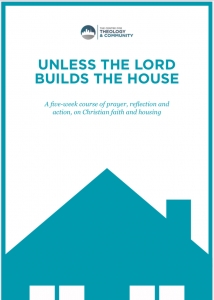
 Miriam Brittenden and Angus Ritchie blog on our new ecumenical course on faith and housing…
Miriam Brittenden and Angus Ritchie blog on our new ecumenical course on faith and housing…
Housing is a spiritual matter. It is about what Pope Francis calls our “human ecology” – the way our physical environment – whether urban, suburban, or rural – reflects and shapes our relationships with each other, and ultimately with God.
In recent years, churches have been increasingly active in speaking and acting on housing. In 2018 later, the Catholic Bishops of England and Wales commended Abide in me: Catholic Social Thought and Action on Housing Challenges in England and Wales – the fruit of community listening, theological reflection and collaboration across denominations, involving both Caritas Social Action Network (CSAN) and the Centre for Theology and Community.
In 2019, the Archbishop of Canterbury launched his Commission on Housing, Church and Community, which has explored the contribution that Christians can make to tackling the housing crisis – and why this is an integral part of the Church’s mission, rooted in a theological understanding of housing and community. Building Community: Local Church Responses to the Housing Crisis was published by CTC and the Church of England, as a background report for the Commission’s work.
These two streams of reflection and action have together generated Unless the Lord Builds the House – a new five-week course of prayer, reflection and action, on Christian faith and housing.
Each 90-minute session has a mix of Bible study, video stories and discussion. It ends with suggestions for prayer and ideas for action – some of which can be taken between sessions, while others would require more long-term planning and commitment.
At the heart of this course is the question of who is building and acting. The Psalmist writes that “unless the Lord builds the house, those who labour build in vain” (127.1). It is our conviction that a better “human ecology” will only emerge when we are open and attentive to the work of the Holy Spirit, so that we do not labour in our own power alone, but as “God’s fellow workers…God’s field, God’s building” (1 Corinthians 3.9).
In Scripture, we see that God’s action usually emerges from amongst those the wider society underestimates or simply ignores. If we are to be God’s co-workers, we will need to listen to his Word, and also to the poorest in our communities – so that the wider Body can see, judge and act with them – and not just on their behalf.
– In sessions one and two, we focus on seeing our neighbourhood with God’s eyes – engaging with the stories of characters in the Gospels who are not “seen” by the wider society but whom Jesus tells us are precious in the eyes of God. This will lead on to a practical action to see our neighbourhood with fresh eyes.
– In sessions three and four, we focus on hearing God’s judgment – reflecting on what the Bible has to say about God’s care for the poorest, and the kinds of communities he wants to build with and for his children.
– In session five, we focus on acting as God’s co-workers – taking realistic and practical steps to work for the good of our area
Most of this course was written – and its videos were filmed – before the coronavirus pandemic. It has revealed a great deal about the “human ecology” of our cities, towns and villages. Systemic social injustices – including racial injustices – have become even harder to ignore. People’s different housing conditions have had a huge impact on their experience of lockdown.
It is our hope and prayer that this course will help Christians to turn the desire for a more just future into prayerful, practical and effective action.


Leave a Comment